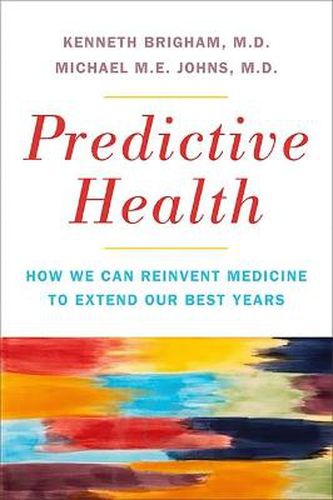Readings Newsletter
Become a Readings Member to make your shopping experience even easier.
Sign in or sign up for free!
You’re not far away from qualifying for FREE standard shipping within Australia
You’ve qualified for FREE standard shipping within Australia
The cart is loading…






Our health care system is crippled by desperate efforts to prevent the inevitable. A third of the national Medicare budget- nearly 175 billion- is spent on the final year of life, and a third of that amount on the final month, often on expensive (and futile) treatments. Such efforts betray a fundamental flaw in how we think about healthcare: we squander resources on hopeless situations, instead of using them to actually improve health. In Predictive Health , distinguished doctors Kenneth Brigham and Michael M.E. Johns propose a solution: invest earlier- and use science and technology to make healthcare more available and affordable. Every child would begin life with a post-natal genetic screen, when potential risk- say for type II diabetes or heart disease- would be found. More data on biology, behaviour, and environment would be captured throughout her life. Using this information, health-care workers and the people they care for could forge personal strategies for healthier living long before a small glitch blows up into major disease. This real health care wouldn’t just replace much of modern disease care- it would make it obsolete. The result, according to Brigham and Johns, will be a life defined by a long stay at top physical and mental form, rather than an early peak and long decline. Accomplishing this goal will require new tools, new clinics, fewer doctors and more mentors, smarter companies, and engaged patients. In short, it will require a revolution. Thanks to a decade-long collaboration between Brigham, Johns and others, it is already underway. An optimistic plan for reducing or eliminating many chronic diseases as well as reforming our faltering medical system, Predictive Health
is a deeply knowledgeable, deeply humane proposal for how we can reallocate expenses and resources to prolong the best years of life, rather than extending the worst.
$9.00 standard shipping within Australia
FREE standard shipping within Australia for orders over $100.00
Express & International shipping calculated at checkout
Our health care system is crippled by desperate efforts to prevent the inevitable. A third of the national Medicare budget- nearly 175 billion- is spent on the final year of life, and a third of that amount on the final month, often on expensive (and futile) treatments. Such efforts betray a fundamental flaw in how we think about healthcare: we squander resources on hopeless situations, instead of using them to actually improve health. In Predictive Health , distinguished doctors Kenneth Brigham and Michael M.E. Johns propose a solution: invest earlier- and use science and technology to make healthcare more available and affordable. Every child would begin life with a post-natal genetic screen, when potential risk- say for type II diabetes or heart disease- would be found. More data on biology, behaviour, and environment would be captured throughout her life. Using this information, health-care workers and the people they care for could forge personal strategies for healthier living long before a small glitch blows up into major disease. This real health care wouldn’t just replace much of modern disease care- it would make it obsolete. The result, according to Brigham and Johns, will be a life defined by a long stay at top physical and mental form, rather than an early peak and long decline. Accomplishing this goal will require new tools, new clinics, fewer doctors and more mentors, smarter companies, and engaged patients. In short, it will require a revolution. Thanks to a decade-long collaboration between Brigham, Johns and others, it is already underway. An optimistic plan for reducing or eliminating many chronic diseases as well as reforming our faltering medical system, Predictive Health
is a deeply knowledgeable, deeply humane proposal for how we can reallocate expenses and resources to prolong the best years of life, rather than extending the worst.